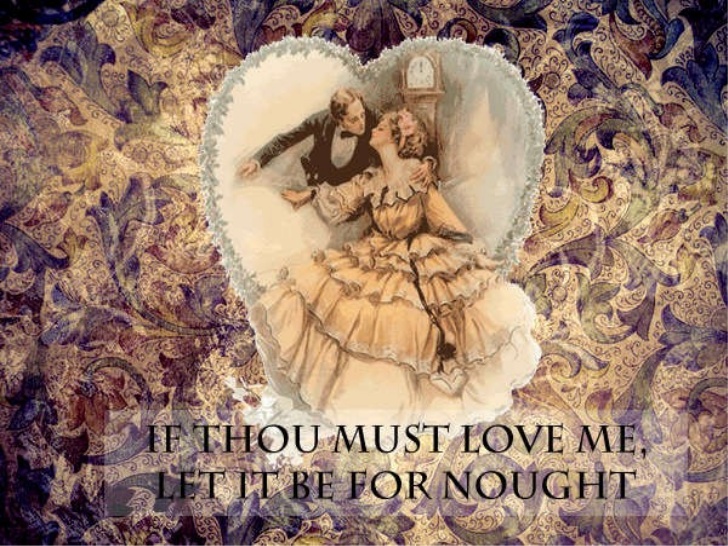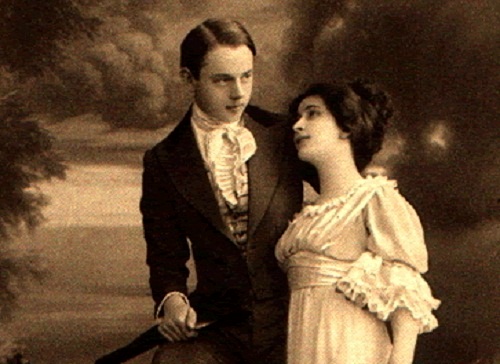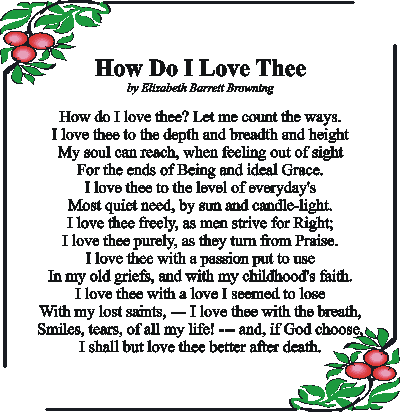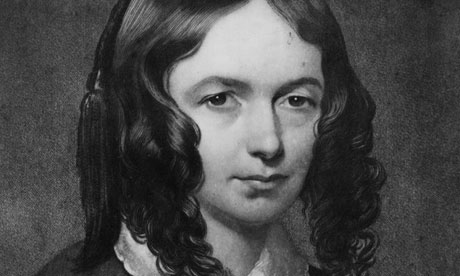“A Man’s Requirements” is considered among Elizabeth Barrett Browning’s more well-known love poems. Not as popular as “How Do Love Thee?”, “A Man’s Requirements” is less religious and very direct in its delivery. An in depth analysis of “A Man’s Requirements” is a difficult task given the straightforward nature of the prose. The intentions behind and the hidden meanings within the poem are the elements that make this piece of work so significant.
On first glance, the poem seems to be what it presents itself to be: a man’s requirements from his love. However, given the fact that the author is a female, it can be argued that the poem is about what a woman wants from her love as well. The main message of “Love me” is used repeatedly. This repetition seems to symbolize the author’s pleas to her man to do so as if she is willing the message to penetrate through. Although it is written from a man’s point of view, it is easy to forget who is speaking because it paints a picture of a full and all-encompassing kind of love that anyone would want and everyone deserves. Given the issues that Elizabeth Barrett Browning was dealing with in her personal life, such as the deaths of her family members and her own ailing health, it speaks volumes of how strong and influential her relationship with her husband, Robert Browning, was to her. The strength of their love for each other was so strong that it helped to create this beautiful poem in spite of some very dire cirmumstances.
From the beginning “Love me Sweet, with all thou art/Feeling, thinking, seeing;” (ln 1-2), the need for a love involving the whole self and all senses is apparent. The poem begins with many other senses: “Love me with thine azure eyes” (ln9), “Love me with thine hands stretched out” (ln 17), “Love me with thy loitering foot” (ln 19), “Love me with thy voice, that turns” (ln 21). As “A Man’s Requirements” progresses, more ethereal elements are called upon: “Love me with thy thinking soul,” (ln 25), “Love me with thy gorgeous airs,” (ln 29), and “Love me pure, as muses do,” (ln 33). Browning creates a literary crescendo that pulls us in. Her views on love and experiences with it are clearly reflected in her words. The ways that one should love and the completeness of that love are so beautifully described in “A Man’s Requirements”. By the end ,the reader is fully invested in this love.
Another strong theme that resonates throughout “A Man’s Requirements”, is the idea of a love that lasts a lifetime. There are two instances in which Browning addresses this: “Love me with thy thoughts that roll/On through living—dying” (ln27-28) and “Love me for the house and grave,/And for something higher.” (ln 39-40). She begins with “Love me with thine open youth” (ln 5) which suggests a love akin to a child. Children tend to emote without a filter, therefore to love like a child would be to love without restraint. This all-encompassing love is, not only expected to last throughout life, but after death as well. This is really the only circumstance where Browning’s strong religious influence is apparent within this work. The idea of a love that last a lifetime is significant because of Elizabeth Barrett Browning’s own influences on love. Her own parents did not have a lifetime love and she herself refused her first proposal from Robert Browning. It seems that “A Man’s Requirements” is a checklist of sorts for what Robert Browning had to do to win her as well as what she was willing to do for him. The theme of eternal love is also significant because Browning was dealing with her own physical ailments herself and her father was opposed to her relationship with Robert Browning. Instead of these obstacles coloring her wordswith negativity, Browning creates a positive and encouraging piece. This is significant because “A Man’s Requirements” is almost solely influenced by her relationship with her husband. It describes a love that is genuine, pure and leaves anyone involved with no doubt about its substance.
The only part of “A Man’s Requirements” that can be interpreted as negative or at the very least different from the flow of the rest of the poem is the end. The last stanza:
Thus, if thou wilt prove me, Dear,
Woman’s love no fable,
I will love thee—half a year—
As a man is able. (ln 41-44)
There are a couple of ways to interpret this ending. The first is to take it literally. A man tells his love all the ways he wants to be loved and in the end he will give her all that he can which, it turns out, is not much. The unbalanced nature of the poem, from the man’s requirements to his love what he is willing to give her, is so significant that reader cannot help but be perplexed as to the reason. If not for the well documented success of her marriage, it could be interpreted that she does not believe that a man is capable of much reciprocation regarding love. Another explanation for the ending is simply that Browning is being humorous to help emphasize the significance and enormity of the love that one can strive for. The last lines bring the poem back down to reality, in a sense, by reminding us that although there are high expectations, there are also limitations. It reminds us to keep things in perspective and to be realistic with those expectations.
Some online learning platforms provide certifications, while others are designed to simply grow your skills in your personal and professional life. Including Masterclass and Coursera, here are our recommendations for the best online learning platforms you can sign up for today.
The 7 Best Online Learning Platforms of 2022
- Best Overall: Coursera
- Best for Niche Topics: Udemy
- Best for Creative Fields: Skillshare
- Best for Celebrity Lessons: MasterClass
- Best for STEM: EdX
- Best for Career Building: Udacity
- Best for Data Learning: Pluralsight















